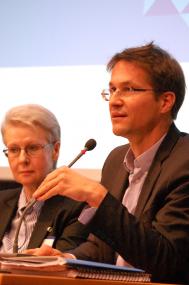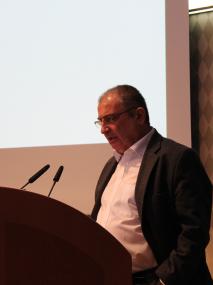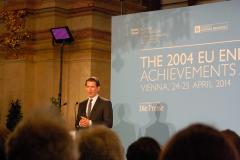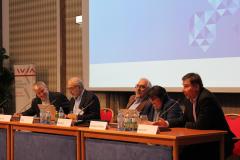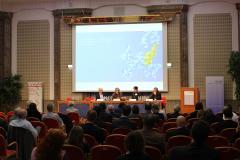International conference 'The 2004 EU Enlargement − Ten Years After: Achievements and Next Steps'
28 April 2014
On 1st May 2004 ten countries – mostly from Central and Eastern Europe – became new members of the European Union. On the 10th anniversary of this event wiiw co-organised an international conference.
In order to organise this conference that took place in Vienna on 24-25 April 2014, the Institute for Human Sciences (IWM), the Austrian Central Bank (OeNB), the Austrian Ministry of Foreign Affairs and wiiw have joined forces. Most sessions of the conference took place on the premises of the Austrian Central Bank; an additional evening panel was hosted by the Austrian Foreign Ministry and was co-sponsored by the Federation of Austrian Industries.
As the title of the conference indicates, the conference covered both ‘achievements’ as well as ‘next steps’ but the focus of the discussion at the conference concentrated on ‘unfinished business’, i.e. the enormous challenges which policy-makers in the European Union will have to face over the coming years. Since 2004 various strains and stresses seem to have accumulated and even accelerated, in particular following the outbreak of the economic crisis in 2008 and culminating most recently in the crisis in Ukraine.
The sessions of the conference reflected these challenges:
Session 1 ‘Overcoming new chasms in EU’s Neighbourhood’ discussed recent developments in Ukraine and EU−Russia relationships, explored the deeper roots of the crisis and attempted to find longer-term solutions. The session chair was Gerald Knaus, the Director of the European Stability Pact, and with him there were important analysts from Moscow (Lilia Shevtsova), Kiev (Olga Bielkowa), Sofia and Vienna (Ivan Krastev and Herbert Stepic).
Session 2 ‘Towards Stability in the Balkans’ covered the impact of further EU accessions over the next decade which is expected to include the remaining countries of the Balkans. The focus here was the path of accession, economic and political stability of the region and the impact this might have on the EU as a whole. The session was chaired by Ellen Goldstein (country director for Southeast Europe, World Bank) and included well-known academics and activists from Belgrade (Vesna Pešić), Zagreb (Žarko Puhovski), and experts from Washington (Susan Woodward) and Vienna (Vladimir Gligorov).
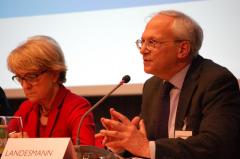
Danuta Huebner, Michael Landesmann; photo © wiiw
Session 3 ‘The economic crisis and how to resuscitate convergence in Europe’ took up the issue of the tensions and disparities which developed in the course of the recent economic crisis and which have brought into question the belief in ‘cohesion’ and ‘convergence’ of living and social standards in the European Union. Are the policy initiatives which have evolved during the crisis at national and EU levels capable and sufficient to resurrect prospects for convergence? Michael Landesmann (wiiw) chaired this session, with former EU Commissioner Danuta Huebner, Jan Svejnar (Columbia University), Loukas Tsoukalis (Athens), and former Commissioner and former Hungarian Minister of Foreign Affairs Péter Balázs on the panel.
The evening panel was introduced by both Austria’s Foreign Minister Sebastian Kurz and the head of the Austrian Federation of Industry, Georg Kapsch, and moderated by Christian Ultsch from Die Presse. The panel included the Slovak Deputy Prime Minister and Minister of Foreign Affairs, Miroslav Lajčák, the Hungarian Minister of State for EU Affairs Enikő Győri, the State Secretary of Foreign Affairs of Slovenia, Igor Senčar, and representatives from the business and banking sectors, Andrej Mertelj (Datalab, Slovenia) and Andreas Treichl (Erste Bank, Austria). The discussion on this panel extended over the entire range of issues covered by the conference as a whole (‘Achievements, Lessons Learned, Challenges Ahead’) from the perspective of acting Ministers and representatives from the business community.
On the morning of 25th April, the conference resumed with two Special Sessions which celebrate the 75th OeNB East Jour Fixe which had been organised by the Foreign Research Division of the Austrian Central Bank since the start of the transition in 1989. Heads of the Macroeconomic and Research Departments of Central Banks as well as other monetary policy analysts discussed two topics: ‘Exchange Rate Strategies and Competitiveness’ and ‘Challenges of Financial Stability’ drawing on the experiences of the new member countries prior to and following EU accession. These two sessions were chaired by Doris Ritzberger- Grünwald (Director, Economic Analysis and Research Department, OeNB) and Helene Schuberth (Head, Foreign Research Division, OeNB) respectively.
The final two sessions on Friday afternoon took a distinctive political science and historical view of European developments:
Session 6 ‘European Integration and Nationalism: Two Steps Forward, One Step Back’ (chaired by Ivan Krastev from IWM and the Centre for Liberal Strategies in Sofia) analysed the ongoing tension between the two forces which are and have been characterising Europe historically and have resurfaced more prominently in the wake of the economic crisis: nationalism on the one hand and European integration on the other hand. Eminent political scientists, politicians and international relations experts were on the panel: Alina Mungiu-Pippidi (Berlin), Lajos Bokros (former Finance Minister of Hungary, now MEP), Soli Ozel (Istanbul) and Anton Pelinka (Budapest and Vienna).
Session 7 ‘A Century of European Disintegration and Integration: 1914–2014’ (chaired by Timothy Snyder, Yale and IWM) took the long-run view, constructing a century-long bridge starting with this year’s other anniversary of 1914 up to the year 2014 which has indeed been a century of waves of disintegration and reintegration of Europe. The task of this session was to locate current and potential future developments in this longer-run context. Speakers on this panel comprised eminent historians and political scientists from the US (Timothy Snyder and Holly Case), Ukraine (Yaroslav Hrytsak) and Poland (Dariusz Stola).
Videos of most of the sessions are available on a separate page.

